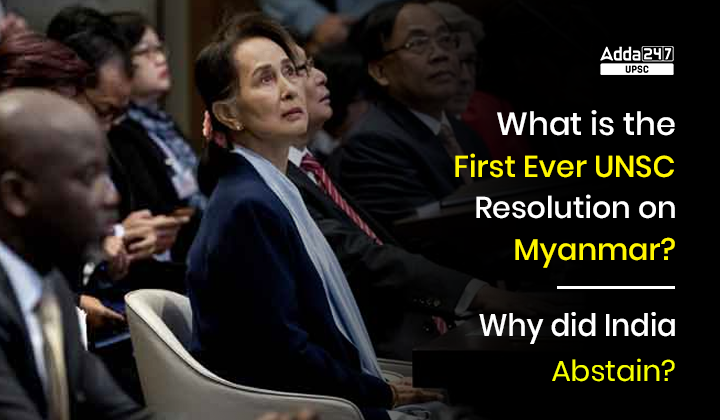Table of Contents
Relevance of UNSC Resolution on Myanmar for UPSC
UNSC Resolution on Myanmar: In February, 2021, military seized control of Myanmar and detained Aung San Suu Kyi and other leaders of her National League for Democracy (NLD). Being at the center of the India-Southeast Asia geography, Myanmar is geopolitically significant for India and also plays an important role in India’s “Neighborhood First” policy and its “Act East” policy. UNSC Resolution on Myanmar covers GS Paper 2: International Relations- Effect of policies and politics of developed and developing countries on India’s interests.
The Editorial Analysis- Executions in Myanmar
What is the Issue?
- Recently, the United Nations Security Council has adopted its first-ever resolution on the situation in Myanmar.
- The resolution calls for “immediate release all arbitrarily detained prisoners,” including 77-year-old Suu Kyi and ex-president Win Myint.
India-Myanmar Relation
Who Initiated, who supported and who not supported the UNSC Resolution on Myanmar?
- The UK had drafted the text of this resolution in September, following which several amendments were made to ensure its passing.
- However, the text relating to the council’s determination to use all its powers if Myanmar fails to adhere to the resolution was reportedly dropped.
- The final text has been passed with 12 votes in favor, none against, and three abstentions from China, India, and Russia.
- Apart from that, several members objected to a provision requesting the UN secretary-general to report to the council on the situation in Myanmar every 60 days.
Did You Know?
|
What is happening in Myanmar?
- Since the junta violently seized power in February 2021, they have conducted a brutal campaign against the people of Myanmar – burning villages, running indiscriminate airstrikes, torture and mass killings
- Freedoms and rights in Myanmar under the military junta have deteriorated markedly.
- State executions have returned, thousands of people have been arrested for protesting against military rule, and the number of documented violent attacks by the army on civilian areas, including schools, has surged, according to non-governmental organizations.
- The junta claims it is fighting what it calls “terrorists,” and promises a return to peace.
- So, the UNSC Resolution comes nearly two years after the military staged a violent coup, overthrowing the democratically elected government and arresting civilian leaders including Suu Kyi.
Where is Suu Kyi?
-
- Suu Kyi is currently being held in solitary confinement at a prison in the capital Naypyidaw on a slew of charges.
- To date, the 77-year-old former Nobel Nobel Peace Prize winner has been sentenced to 26 years in prison, including three years of hard labor.
- The convictions, which critics and international observers say are politically motivated, mostly relate to the November 2020 general election that her National League for Democracy won in a landslide, defeating a party created by the military.
Why the recent UNSC Resolution on Myanmar is called historic?
- The recent UNSC resolution on Myanmar is historic considering that the 15-member council has been split on Myanmar for decades. Earlier, the body used to issue only formal statements on the state of the country, staying away from meddling in its internal affairs.
- The last UNSC resolution regarding Myanmar was the one the UN passed in 1948, approving the country’s membership to the world body.
- So, the recent UNSC Resolution on Myanmar is historic as this is the first ever resolution passed on this Southeast Asian country since its independence.
| Did You Know?: The only other UNSC resolution on Myanmar was in 1948, after the country formerly known as Burma got independence from Great Britain, when the Council recommended to the General Assembly “that the Union of Burma” be admitted to membership in the United Nations. |
What does the UNSC Resolution on Myanmar Says?
- UNSC Resolution 2669 on Myanmar expressed “deep concern at the ongoing state of emergency imposed by the military,” and emphasized the need to tackle several long-standing issues.
- It also called for greater humanitarian assistance for victims of violence, with emphasis on women, children and displaced populations, including the Rohingya – a persecuted mostly Muslim minority.
- The United Nations Security Council (UNSC) has called on Myanmar’s ruling military junta to release all political prisoners, including deposed State Counselor Aung San Suu Kyi and former President Win Myint.
- The resolution has also sought “an immediate end to all forms of violence”, asking for “all parties to respect human rights, fundamental freedoms and the rule of law.”
- So, this resolution sends a clear message: the Security Council is deeply concerned at what is happening in Myanmar at the hands of the military and the so-called ‘state of emergency’ imposed to oppress the people’s calls for peace and democracy.
Why did India Abstain from voting under the First Ever UNSC Resolution on Myanmar?
- India shares nearly 1,700 kilometres-long border with Myanmar and has historical and cultural links with its people. So, it did not want to interfere in its South-East Asian Neighbor’s Internal Politics at a platform like UNSC.
- Although India is also in favor of peace and resolve in Myanmar, as any instability in the country impacts us directly. Resolving the current crisis and maintenance of peace, stability and prosperity in Myanmar is therefore of direct interest to our national security.
- As Myanmar’s neighbor, India better understands the internal politics and internal situation in Myanmar, so it did not go for a vote at UNSC, rather it stressed on a need that all parties in the country should abjure all violence and return to the path of dialogue.
- The nature of the recent UNSC Resolution on Myanmar is more of advisory and appealing in nature, so it could not convince India about the impact of this resolution in making progress towards a resolution of the issues in Myanmar.
- Explaining India’s Abstaining, India’s Permanent Representative to the UN and President of the 15-nation UN Security Council for the month of December Ambassador Ruchira Kamboj said, ”complex situation in Myanmar calls for an approach of quiet and patient diplomacy.”
Also Read:
Taliban Banned University Education for Afghani Women!
Recent IR Articles:
| Exercise “SURYA KIRAN-XVI” 2022 | Indo-Greek Conference 2022 | India-China Face Off in Tawang: know Everything for UPSC | What is SAARC Currency Swap Framework? | RBI Signed Agreement With Maldives |
| How BIMSTEC Can Build a New South Asian Regional Order?: The Hindu Editorial Analysis | First India-Central Asia Meeting of NSAs: Significance for Regional Security? | India’s G20 Presidency- 1st Sherpa Meeting Begins | What is Sylhet-Silchar Festival 2022? | All Details for UPSC |
| UNESCO India Africa Hackathon 2022 is being Organized in Uttar Pradesh | What is India-Australia FTA? | Know Everything about AI-ECTA for UPSC | What is India-Bangladesh Friendship Pipeline (IBFPL)? | What is Bali Yatra of Odisha? | Significance for UPSC |
| Removal of India from US’ Currency Monitoring List: Possible Outcomes for India? | 2nd BIMSTEC Agriculture Ministers Meeting 2022 | Russia’s loss in Kherson- Russia Withdrew from Kherson | Indo-Pacific Regional Dialogue 2022 (IPRD-2022) |
| COP 19 CITES Meeting 2022- Relief provided to Indian Handicraft Exporters | G20 Summit 2023- India’s G20 Presidency & Tourism Opportunities for N-E States | India’s “In our LiFEtime” Campaign Launched at COP 27, Sharm El-Sheikh | 19th ASEAN-India Summit 2022- Key Outcomes and Way Forward |



 TSPSC Group 1 Question Paper 2024, Downl...
TSPSC Group 1 Question Paper 2024, Downl...
 TSPSC Group 1 Answer key 2024 Out, Downl...
TSPSC Group 1 Answer key 2024 Out, Downl...
 UPSC Prelims 2024 Question Paper, Downlo...
UPSC Prelims 2024 Question Paper, Downlo...





